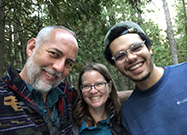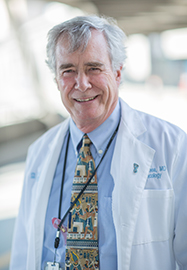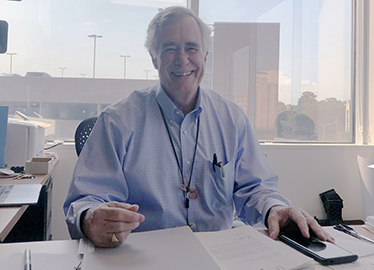Behind the Scenes — October 2019
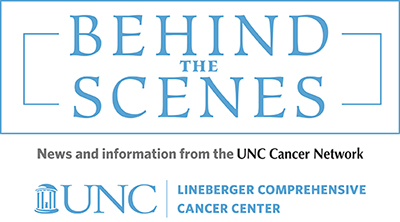
From the Telehealth Director
Dear UNC Cancer Network Community Members,
This month’s From the Telehealth Director article will be short and sweet, as my wife and I are currently vacationing with our son in and around Acadia National Park in Maine.
I know that you will enjoy Mary’s article on Dr. Shea. We are really going to miss him. Our team wishes him the very best as he begins this new and exciting chapter in his life.
Please keep spreading the word to your colleagues and friends regarding the live and self-paced, for-credit oncology lectures that we offer and www.unccn.org . We are very appreciative to each of you for all that you do to publicize UNCCN lectures.
Wishing you and your family a very pleasant fall,
Best wishes to all, Tim.
![]()
The Legendary Dr. Thomas Shea is Retiring!
by Mary E. King
Dr. Thomas C. Shea, MD, was the John William Pope Distinguished Professor in Cancer Research and the Co-Director of the Bone Marrow Transplant and Cellular Therapy Program. He was also the Associate Director for Outreach Programs and Director of the UNC Cancer Network (UNCCN). He retired at the end of September 2019.
During his tenure at UNC, Dr. Shea played a tremendous role in improving the lives of patients, and his contributions to UNCCN are irreplaceable. I had the pleasure of interviewing Dr. Shea, before his departure, and asked him to reflect on his time at UNC. Read this interview to get to know him better and discover some secrets of a successful career and person.
Dr. Shea, how do you feel about retiring from UNC?
A little sad, a little strange and a little excited! It will be a big change but one I am looking forward to.
What will you miss most about working at UNC?
The people I work with both at UNC and across the country and the patients I take care of. I will also miss the opportunity to teach and provide consultations to other physicians
What will you miss most about the UNC Cancer Network (UNCCN)?
The chance to continue expanding and improving our educational programs by working with professionals, lay audiences and student across the state.
What excites you most about the UNC Cancer Network?
The opportunities to provide long distance education and patient consultations in an efficient and environmentally responsible manner.
What was the last experience that made you want to do more for your patients or a particular patient?
The last experience was reading some of the notes of gratitude I have received from patients and their families over the last couple of weeks since I have announced my plans to retire. The work we do in providing care to patients with cancer is not easy, and notes like I have been receiving always help to remind me how important what we do and how we do it is to people that are dealing with these terrible diseases.
What has been the most important innovation you have been involved with so far in your lifetime?
In the transplant world it has been the use of stem cells collected from the blood rather than the marrow and in recent years, the ability to effectively and safely use donors that are only partially matched with their recipients and not have life threatening or fatal side effects. This allows us to find donors for almost everyone who needs a transplant and not just the patients lucky enough to have a matched sibling or unrelated donor. In the non-transplant field, the most exciting innovations have come in the last 10 years with the ability to use immune therapies like antibodies and targeted treatments like CAR T cells that have fewer side effects and in many cases are more effective than traditional chemotherapy treatments
What are a few career lessons that you’ve learned over the years that you’d like to share with our readers?
For patients, staying healthy and avoiding things that increase the risk of developing cancer like smoking, not getting enough exercise and very overweight are even more important and better than getting effective treatment. For providers, it is critically important that you love what you do and take care of yourself and your family, because they also make sacrifices all the time that help you be more effective in your role as a practitioner over the long run of your career.
What does leadership mean to you?
Being creative, being an effective role model, and sharing the work and the rewards with other capable people around them are the keys to success. Everyone wants to make positive contributions to the world and work environment and a good leader finds ways to match his or her staff’s skills and passions with the challenges that the leader identifies as the key issues to be addressed.
How do you define success?
Achieving goals identified in an efficient, inclusive and sustainable fashion
Do you feel you have achieved success in your career?
Yes, one never achieves everything that you’d like to, but I have been very fortunate to have developed some very successful programs that have been staffed over the years with remarkable and extremely loyal people.
Please share one of your favorite stories from work.
One of my favorite stories dates back to when I was a Fellow in Boston and was able to arrange for a medical student to graduate early and receive his diploma in the hospital room of his mother who was dying from leukemia and would not have survived to see him graduate with his class 4 months later. The Medical School Dean came to the hospital room and we had a ceremony at her bedside that I still remember as one of the highlights of my career.
If you could meet anyone, present or past, who would it be and why?
If it would make a difference, I would like to meet President Trump and ask him to spend less time dismantling the Affordable Care Act and spend more time trying to fix our dysfunctional health care system. As a provider who cares for people from across the financial spectrum, I am always reminded how unfairly distributed our care is and how devastating the cost of care is to patients and their loved ones.
Do you have a favorite quote? If you do, what is it and why is it your favorite?
From the poem Desiderata by Max Ehrmann: If you compare yourself with others, you may become vain or bitter, for always there will be greater and lesser persons than yourself.
This is just one line from a very beautiful piece and in a competitive world, these words and many others that are in this poem are always important to remember.
How do you plan to spend your free time after retirement?
Playing golf, reading, travelling and car camping, and maybe volunteering with Habitat for Humanity and free clinics in Raleigh
Do you have a favorite travel destination?
I want to go to the Middle East and want to see the Northern Lights
What are you currently reading?
A book by Anne Perry about a turn of the century police inspector in London
Please finish this statement – I’m happiest when . . .
I have finished my clinic notes and all my patients are tucked in so I can spend time relaxing with friends and family
Thank you, Dr. Shea, for your game-changing achievements and contributions that transformed the lives of others. Your leadership and guidance will be sorely missed. Our heartfelt congratulations on your retirement!
![]()

Upcoming Live Events
Myriam Peereboom, MBA/MHA, CMI, CHITM
Working with Patients through Interpreter Services
https://unclineberger.org/unclcn/professional-education/calendars/telehealth-lectures/”
Sometimes patients and their families have problems working with physicians and nurses because of language barriers. Myriam Peereboom, MBA/MHA, CMI, CHITM, will discuss the role(s) that an interpreter plays within the treatment plan as well as their modes and methods of conveying information back and forth. She will also share the importance in utilizing a qualified interpreter and the legal implications from using an unqualified interpreter.
Bhisham Chera, MD
Clinical Trial Update in HPV-Associated Oropharynx Cancer
https://unclineberger.org/unclcn/professional-education/calendars/telehealth-lectures/”
The Head and Neck Oncology program is actively pursuing a number of clinical trials at UNC. Dr. Bhisham S. Chera will provide an update on some of these trials.
![]()
The Patient Education Corner
Expert information for the patients you care for in language that everyone can understand
by Jennifer Potter, MPH, CHES
Living Well with Breast Cancer
Breast cancer is a part of everyday life for many women. In this talk, you will learn tips for coping with the side effects, emotions, and fatigue that often comes with a breast cancer diagnosis. Our speaker will be Kristalyn Gallagher, DO, FACOS, FACS.
Our next Cancer Conversations webinar is on 10/25/19 at 12:00 noon. Viewers can register by clicking here.
![]()
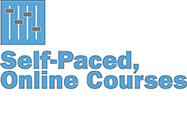
Recent Additions to the Learning Portal
Shifali Arora, MD
Kathleen Ferrell, PA-C
The Many Roads of Esophageal Cancer: Treatments, Side Effects and Common Complications
https://learn.unccn.org/online-course-catalog/rn-and-allied-health-courses/”
Esophageal cancer treatments have evolved greatly over the last few decades. Depending on depth of invasion, endoscopic therapies are now part of the treatment algorithm. We will follow two cases from diagnosis to treatment to highlight therapeutic options and common side effects and complications.
Claire Gillett, RN, MSN, OCN
Professional Development and Continuing Education for Oncology Nurses
https://learn.unccn.org/online-course-catalog/rn-and-allied-health-courses/“
This lecture includes a review of professional development guidelines for Oncology Nurses, including education requirements for the State of North Carolina Board of Nursing. Claire Gillett will review favorite places to receive continuing education credits, as well as the UNC Lineberger Comprehensive Cancer Center’s/UNC Cancer Network’s RN education program and our 2019 schedule and list of topics.
![]()
Learn more about the continuing education and other outreach efforts of the UNC Cancer Network. Many of the outreach programs that are part of the UNC Cancer Network are funded through the University Cancer Research Fund. Find out what UNCCN is doing by following us on Twitter at @unc_cn, join us on Facebook at www.facebook.com/unccn, unccn.org, or email us at unccn@unc.edu
We have signed you up for our newsletter with the hope that you will find value in its content. If this was forwarded to you by a colleague or friend, and you want to be added to our distribution list, please send us an email at unccnoperations@unc.edu.
Editor: Mary King, meking@email.unc.edu
Contributors: Dr. Thomas C. Shea; Tim Poe, Telehealth Director: Jon Powell, PhD, Continuing Education Specialist: and Veneranda Obure, AV Support Engineer.
Copyright © 2019 UNC School of Medicine Office of Information Systems, All rights reserved.
